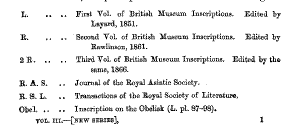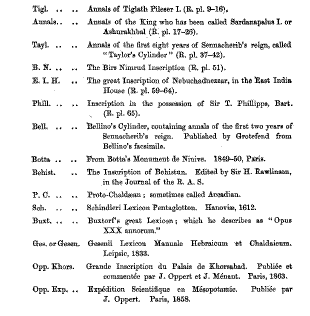No CrossRef data available.
Article contents
Art. I.—Contributions towards a Glossary of the Assyrian Language
Published online by Cambridge University Press: 15 March 2011
Extract
I think it may be of some utility to the Students of the Assyrian Language to bring together in the form of a Glossary a certain number of words of which the meaning appears to be established with a reasonable amount of probability. I have here presented to the Society the commencement of such a work, to be continued, as I hope, on a future occasion. I have not followed any alphabetical order, but have numbered the words, so that in the event of their becoming sufficiently numerous, an alphabetical index referring to these numbers may be added. I have been very careful to refer to passages in which the words are found, so as to enable any one to verify their accuracy. I have used some typographical abbreviations, the prinicple of which are the following:—


- Type
- Original Communications
- Information
- Copyright
- Copyright © The Royal Asiatic Society 1867
References
page 4 note * Transactions of the R.S.L., Vol. 8, p. 107.
page 7 note * The Coptic has nosher (Tattam's Egyptian Dictionary, p. 315). Is this an ancient Egyptian word?
page 8 note * Zeitschrift für die Kunde des Morgenlandes, p. 31.
page 12 note * The vase of the ancient king Naram Sin, found at Babylon, was of alabaster. See the article Alabaster in Smith's Dictionary of the Bible, with the figures of Vases.
page 17 note * I may observe in passing, that this ![]() dight, in the sense of “arrow” or “arrows,” forms the first part of the name of Tiglath Pileser. That monarch's, name, in Assyrian, begins with
dight, in the sense of “arrow” or “arrows,” forms the first part of the name of Tiglath Pileser. That monarch's, name, in Assyrian, begins with ![]() which is the most usual term for “arrows.”
which is the most usual term for “arrows.”
page 17 note † Ed. Kramer, Vol. 2, p. 46.
page 20 note * Such transpositions are common in Hebrew, for instance, ![]() fo
fo ![]() Vestis.—Gesen.
Vestis.—Gesen.
page 23 note * The commencement of this passage is somewhat injured.
page 35 note * When I made my translation of this curious tablet in the Transaction of the R.S.L., I was not acquainted with this word.
page 45 note * Is it certain that when gold of Ophir is mentioned in the Bible, Ophir is always the name of a country ? May it not sometimes at least have meant gold dust ![]() Job xxviii. 6, says “the Earth has
Job xxviii. 6, says “the Earth has ![]() of gold” (dust of gold).
of gold” (dust of gold).
page 60 note * See Diodorus, Clemens Alexandrinus, and Hesyohius. The name law is very common on the Gnostic gems and amulets.


